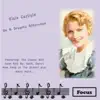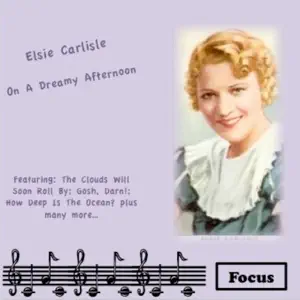


CIUDAD NATAL
Didsbury, Lancashire, England
Acerca de Elsie Carlisle
Elsie Carlisle was beyond a doubt the most popular radio performer in England in the '30s. Proof is even available in the form of her nickname, "Radio Sweetheart Number One." She was a slightly small, unassuming performer who in some ways crystallized the idea of the blonde flapper, an image also utilized by American big-band vocalists such as Annette Hanshaw and Ruth Etting. Comparisons to other singers can be made only on the basis of appearance, however. In terms of singing, Carlisle had her own way with material, such as romantic songs and light comedy. Her reputation was complex as well, as she also developed a part of her style devoted to material bordering on the obscene, and also felt hounded by innuendo and gossip concerning her personal life during some stages of her career.
She was associated with the top bandleaders in the U.K., and with some of the classiest song material, as well. Carlisle was one of the vocalists with the Ambrose Orchestra, which for more than two decades was considered one of the finest dance bands in the nation. Bandleader Bert Ambrose regarded Carlisle as one of his best singers, and found her one of the most difficult to replace. Decca chose the group as one of its first signings after setting up a British branch, and Carlisle was practically chained to the microphone stand for the prolific recording activity that ensued. She was also associated with bandleaders such as Paul Whiteman and Jack Harris. Harris was a partner of Ambrose, and their orchestras would switch off at the fashionable London club Ciro's during the late '30s. In the early '50s, Carlisle's association with bandleader Jack Hylton seemed to be about more than charts and arrangements; they reportedly had an affair, and for years there was speculation that Carlisle had fathered Hylton's child. Gossip mongers later reversed themselves on this hot topic.
A singer who worked with a broad repertoire, Carlisle was nonetheless associated with certain songs, such as the Cole Porter classic "What Is This Thing Called Love?," which she introduced to the public in the first London production of the the musical Wake Up and Dream. She also had a way with comic material, especially in tandem with fellow vocalist Sam Browne; the pair worked together in the Ambrose group, popularizing the ditty "Home James and Don't Spare the Horses," which originated with a country & western publishing house, and also went on tour on their own.
Carlisle recorded "My Handy Man," the Andy Razaf classic blues also chosen for its shock value by other singers such as Ethel Waters. This was not Carlisle's only risque touch: "Pu-leeze! Mister Hemingway" was entirely banned by the BBC, which normally worshipped the ground Carlisle walked on. The song was not the only side stricken from the airwaves by the British network -- there were enough banned songs to easily fill a compact disc, which is just what the HMV-Living Era label did with its Listen to the Banned collection. This label is a good source of Carlisle material in general, on her own or as part of various interesting compilations. ~ Eugene Chadbourne
She was associated with the top bandleaders in the U.K., and with some of the classiest song material, as well. Carlisle was one of the vocalists with the Ambrose Orchestra, which for more than two decades was considered one of the finest dance bands in the nation. Bandleader Bert Ambrose regarded Carlisle as one of his best singers, and found her one of the most difficult to replace. Decca chose the group as one of its first signings after setting up a British branch, and Carlisle was practically chained to the microphone stand for the prolific recording activity that ensued. She was also associated with bandleaders such as Paul Whiteman and Jack Harris. Harris was a partner of Ambrose, and their orchestras would switch off at the fashionable London club Ciro's during the late '30s. In the early '50s, Carlisle's association with bandleader Jack Hylton seemed to be about more than charts and arrangements; they reportedly had an affair, and for years there was speculation that Carlisle had fathered Hylton's child. Gossip mongers later reversed themselves on this hot topic.
A singer who worked with a broad repertoire, Carlisle was nonetheless associated with certain songs, such as the Cole Porter classic "What Is This Thing Called Love?," which she introduced to the public in the first London production of the the musical Wake Up and Dream. She also had a way with comic material, especially in tandem with fellow vocalist Sam Browne; the pair worked together in the Ambrose group, popularizing the ditty "Home James and Don't Spare the Horses," which originated with a country & western publishing house, and also went on tour on their own.
Carlisle recorded "My Handy Man," the Andy Razaf classic blues also chosen for its shock value by other singers such as Ethel Waters. This was not Carlisle's only risque touch: "Pu-leeze! Mister Hemingway" was entirely banned by the BBC, which normally worshipped the ground Carlisle walked on. The song was not the only side stricken from the airwaves by the British network -- there were enough banned songs to easily fill a compact disc, which is just what the HMV-Living Era label did with its Listen to the Banned collection. This label is a good source of Carlisle material in general, on her own or as part of various interesting compilations. ~ Eugene Chadbourne
Nosotros
Notas
